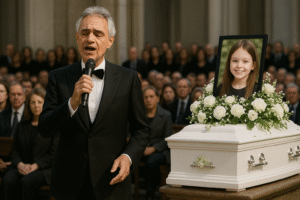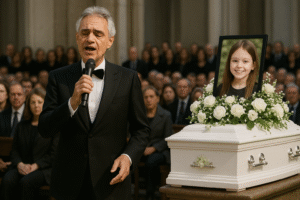The floodwaters came quickly — faster than anyone expected. Streets turned to rivers, homes disappeared under murky waves, and in the heart of a quiet Texas town, a little girl named Elara Grace was taken too soon.
She was only nine.
Elara wasn’t like other children. Born blind, she saw the world through sound. While others played outside, Elara would sit for hours with her headphones on, swaying gently to the music that shaped her inner world. Her favorite was Andrea Bocelli.

“She loved blue,” her mother, Rachel, said through tears. “She said she imagined the color blue whenever Bocelli sang. She thought his voice was the color blue.”
Elara didn’t just listen — she memorized every note. From “Con te partirò” to “The Prayer,” she sang along with startling accuracy, her soft voice rising and falling like the tides. Her room was filled with blue — blue bedsheets, blue curtains, blue twinkle lights — and above her bed, a poster of Andrea, framed carefully so the corners wouldn’t bend.
“She once told me, ‘Mom, when I hear him sing, I forget I can’t see. It’s like he gives me a picture, but in sound.’” Rachel paused. “How do you explain that kind of connection?”

The day of the flood, Elara had just finished a small concert at her school. She wore a royal blue dress and performed “Ave Maria” — a song she said made her feel like she had wings. Her classmates clapped, some teared up. No one knew it would be the last time they’d hear her sing.
That evening, the storm rolled in hard. By midnight, their neighborhood was underwater. Rachel remembers grabbing Elara and her younger brother, trying to escape through waist-deep water. A sudden surge knocked them off their feet. When Rachel surfaced, Elara was gone.
“She was right there,” Rachel whispered. “And then she wasn’t.”
Rescuers searched for hours. They found her the next morning, curled against the roots of an old oak tree. She was still holding the small blue music player she carried everywhere.
Word of Elara’s story traveled fast. A local news segment aired her rendition of “Time to Say Goodbye,” and someone shared it with Andrea Bocelli’s team. No one expected a response. But three days later, something unimaginable happened.
At a private memorial held at Elara’s church, just as her mother stood to speak, a hush fell over the room. A tall man in a black coat stepped forward. It was Andrea Bocelli.
He had come.

Without a word, he walked to the front, placed a single cornflower blue rose atop Elara’s casket, and turned to the piano that had been brought in for the service. He sat down, closed his eyes, and began to sing.
His voice — pure, haunting — filled the chapel with “The Prayer.” Some wept openly. Others sat in stunned silence. Even those who had never heard of him before felt something ancient and sacred move through the room.
After the final note, Andrea stood, bowed his head, and quietly left — no press, no announcement, just a gesture of love for a little girl who saw the world through his music.

Outside, the rain had stopped. A few rays of sunlight pierced the clouds. And in that strange, silent moment, it felt like Elara’s world — blue, full of music and wonder — had been given back to everyone, if only for a heartbeat.
“She loved blue,” her mother repeated. “She loved music… and she loved him. I think she knows he came.”
In the weeks that followed, the town painted a mural on the side of Elara’s school: a swirl of blue skies and musical notes, with a small silhouette of a girl holding a flower. And underneath, in bold white letters, a quote Elara once told her teacher:
“You don’t need eyes to see beauty. You just need a song.”